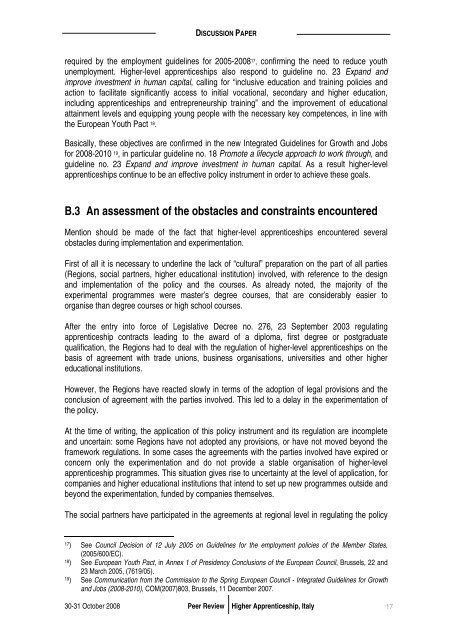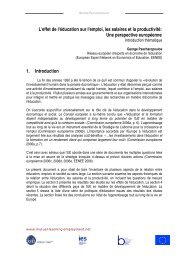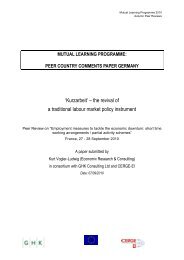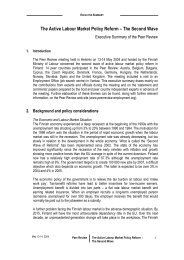Discussion Paper - Mutual Learning Programme
Discussion Paper - Mutual Learning Programme
Discussion Paper - Mutual Learning Programme
You also want an ePaper? Increase the reach of your titles
YUMPU automatically turns print PDFs into web optimized ePapers that Google loves.
DISCUSSION PAPER<br />
required by the employment guidelines for 2005-2008 17 , confirming the need to reduce youth<br />
unemployment. Higher-level apprenticeships also respond to guideline no. 23 Expand and<br />
improve investment in human capital, calling for “inclusive education and training policies and<br />
action to facilitate significantly access to initial vocational, secondary and higher education,<br />
including apprenticeships and entrepreneurship training” and the improvement of educational<br />
attainment levels and equipping young people with the necessary key competences, in line with<br />
the European Youth Pact 18 .<br />
Basically, these objectives are confirmed in the new Integrated Guidelines for Growth and Jobs<br />
for 2008-2010 19, in particular guideline no. 18 Promote a lifecycle approach to work through, and<br />
guideline no. 23 Expand and improve investment in human capital. As a result higher-level<br />
apprenticeships continue to be an effective policy instrument in order to achieve these goals.<br />
B.3 An assessment of the obstacles and constraints encountered<br />
Mention should be made of the fact that higher-level apprenticeships encountered several<br />
obstacles during implementation and experimentation.<br />
First of all it is necessary to underline the lack of “cultural” preparation on the part of all parties<br />
(Regions, social partners, higher educational institution) involved, with reference to the design<br />
and implementation of the policy and the courses. As already noted, the majority of the<br />
experimental programmes were master’s degree courses, that are considerably easier to<br />
organise than degree courses or high school courses.<br />
After the entry into force of Legislative Decree no. 276, 23 September 2003 regulating<br />
apprenticeship contracts leading to the award of a diploma, first degree or postgraduate<br />
qualification, the Regions had to deal with the regulation of higher-level apprenticeships on the<br />
basis of agreement with trade unions, business organisations, universities and other higher<br />
educational institutions.<br />
However, the Regions have reacted slowly in terms of the adoption of legal provisions and the<br />
conclusion of agreement with the parties involved. This led to a delay in the experimentation of<br />
the policy.<br />
At the time of writing, the application of this policy instrument and its regulation are incomplete<br />
and uncertain: some Regions have not adopted any provisions, or have not moved beyond the<br />
framework regulations. In some cases the agreements with the parties involved have expired or<br />
concern only the experimentation and do not provide a stable organisation of higher-level<br />
apprenticeship programmes. This situation gives rise to uncertainty at the level of application, for<br />
companies and higher educational institutions that intend to set up new programmes outside and<br />
beyond the experimentation, funded by companies themselves.<br />
The social partners have participated in the agreements at regional level in regulating the policy<br />
17 ) See Council Decision of 12 July 2005 on Guidelines for the employment policies of the Member States,<br />
(2005/600/EC).<br />
18 ) See European Youth Pact, in Annex 1 of Presidency Conclusions of the European Council, Brussels, 22 and<br />
23 March 2005, (7619/05).<br />
19 ) See Communication from the Commission to the Spring European Council - Integrated Guidelines for Growth<br />
and Jobs (2008-2010), COM(2007)803, Brussels, 11 December 2007.<br />
30-31 October 2008 Peer Review Higher Apprenticeship, Italy<br />
17





